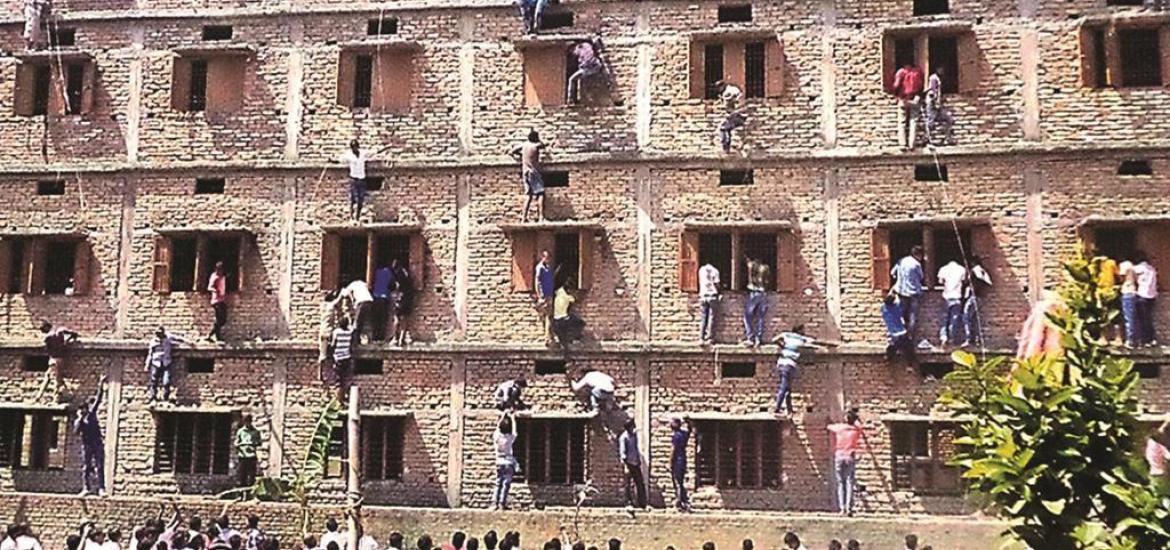The New Law in India enforces a fine of Rs. One Crore and Ten-Years Jail imprisonment for Unfear-means in exams: What can authorities in Pakistan learn from it?
In a significant move to preserve the integrity of the education system, the Indian Government has introduced stringent penalties to combat the rampant issue of examination paper leaks. The new law, which imposes a hefty fine of Rs. one crore and a maximum jail term of 10 years, aims to act as a strong deterrent against this malpractice that has plagued educational institutions across the country for years.
The main aim of this blog post is to provide a detailed analysis of the new law in India that imposes stringent penalties for exam paper leaks and the use of unfair means in examinations. It seeks to explain the rationale behind the law, its potential impact on the education system and the legal implications for offenders. The post will also explore how this legislation aims to uphold the integrity of academic assessments and deter malpractices. By examining various perspectives, it aims to offer a comprehensive understanding of the law's significance and its expected outcomes. Lastly the blog post will discuss, what lessons authorities /examining bodies in Pakistan can learn from the Indian model.
When has the law been enacted?
This Law which is aimed to combat cheating in various national exams, called the Public Examinations -Prevention of Unfair-Means, Act 2024 or the 'anti-paper leak' bill was first introduced in the Lok Sabha on 9th February. The President Droupadi Murmu approved the bill in the same month following which was notified in the official Gazette on Friday the 21st of June and hence the law came into effect the same day.
The rationale behind the Law
Over the past decade, India has witnessed a worrying rise in instances of examination paper leaks and other exam related frauds. These breaches not only undermine the credibility of educational institutions but also erode public trust in the assessment process. The stakes are high, as these leaks affect the future of millions of students who rely on fair examinations to advance in their academic and professional careers.
Examination paper leaks and other unfear-means have long undermined the credibility of India's education system, causing immense distress to students and educators alike. These incidents not only jeopardize the future of hardworking students but also erode public trust in the examination process.
By implementing severe penalties, the government aims to restore confidence in the system and ensure a level playing field for all students. This legislative measure, which imposes a hefty fine of Rs one crore and a maximum jail term of 10 years, underscores the nation's commitment to preserving the integrity of its educational system.
Key provisions of the Law
1. Severe penalties: The law stipulates a fine of up to Rs one crore for individuals found guilty of leaking examination papers. Additionally, offenders may face imprisonment for up to 10 years, depending on the severity of the offense.
2. Broader applicability: The law applies to all public and private educational institutions, covering a wide range of examinations from school-level assessments to Universities level exams and even competitive entrance exams for professional courses and screening tests for various jobs.
3. Swift and strict enforcement: Special task forces and dedicated cyber cells are being established to monitor and prevent paper leaks. The law also empowers authorities to act swiftly against suspects, ensuring that legal proceedings are expedited.
4. Enhanced surveillance and security measures: Educational institutions are now mandated to adopt enhanced security protocols for handling examination materials. This includes the use of encrypted digital systems, secure transportation of physical papers, and rigorous background checks for personnel involved in the examination process.
5. Accountability of institutions: Schools, colleges, and universities will be held accountable for any breaches in examination security. Institutions found negligent in implementing the required security measures may face sanctions, including financial penalties and administrative actions.
Implications for stakeholders
1. Students: This law is a welcome relief for students, who can now prepare for exams without the fear of being unfairly disadvantaged by leaks. It promotes a culture of meritocracy, encouraging students to rely on their own efforts.
2. Educational institutions: Schools, colleges, and universities will need to bolster their security measures to prevent leaks. This may include enhanced surveillance, secure handling of examination materials, and rigorous background checks for staff involved in the exam process.
3. Examination boards/universities: various Boards, Universities and agencies responsible for conducting exams will have to implement robust protocols to safeguard question papers. This includes adopting digital solutions, secure printing technologies, and encrypted communication channels.
Impact on the education sector
The introduction of this law is expected to have a profound impact on the education sector in India. Firstly, it aims to restore confidence among students and parents in the fairness and integrity of the examination system. Secondly, it will compel educational institutions to prioritize and invest in robust security measures, thus reducing the likelihood of future leaks.
Moreover, the law sends a clear message that academic dishonesty at any level will not be tolerated. By imposing severe consequences on those who attempt to undermine the system, the government is reinforcing the importance of merit-based advancement.
Challenges and future prospects
While the new law is a positive step, its success will largely depend on effective implementation. Authorities will need to address potential challenges such as corruption, collusion, and technological loopholes. Continuous monitoring and updates to the law will be necessary to adapt to evolving tactics used by offenders.
Moreover, awareness campaigns must be conducted to educate all stakeholders about the legal consequences of paper leaks and the importance of ethical practices. Collaboration between government bodies, educational institutions, and the tech industry will be crucial in developing foolproof systems to prevent future leaks.
How do other countries handle examination frauds?
The approach to handling examination fraud varies worldwide, with countries implementing a range of measures from institutional policies to legal actions. Countries around the world have implemented various measures to handle examination fraud, reflecting the seriousness of this issue globally.
In the United States, strict anti-cheating protocols are enforced during standardized tests, including digital monitoring and severe penalties for offenders, which include fines and imprisonment. The United Kingdom employs rigorous security measures, such as secure printing facilities and stringent proctoring, and punishes cheating with disqualification and legal action.
In China, examination fraud is considered a criminal offense with culprits facing imprisonment and significant fines. The students could face a sentence of seven years of jail imprisonment on account of cheating during their university entrance exams as the government authorities attempt a crackdown on this pervasive problem for the highly competitive exams. Cheaters will, for the first time, face jail if convicted and shall be banned from taking other national-level entrance exams for three years under the law which has been amended recently.
Similarly, South Korea imposes heavy penalties, including imprisonment, on those found guilty of exam fraud, and uses high-tech methods like facial recognition and biometric verification to ensure the integrity of their examination processes. These international practices highlight a shared commitment to upholding academic integrity through stringent laws and advanced security measures.
India with its new law represents one of the most severe responses globally, reflecting the seriousness with which the country views academic integrity. As nations continue to grapple with the challenges of maintaining fair and credible examination systems, these diverse strategies highlight the global commitment to upholding educational standards.
How do authorities /examining bodies in Pakistan handle examination frauds?
In Pakistan, relevant authorities have adopted stringent measures to combat examination fraud, reflecting a commitment to maintaining the integrity of our educational system. Various examination boards, universities and commissions have been established with strict protocols for conducting exams, including secure transportation and storage of exam papers, and deploying invigilators to monitor the process closely. Legal repercussions for those caught cheating or involved in paper leaks include fines, disqualification and detention.
In recent years, technology has been increasingly employed to enhance security such as the use of computer based examinations, biometric verification and digital monitoring. Additionally, there have been efforts to reform examination practices and increase transparency at the institutional level.
While Pakistan has implemented a range of measures to combat examination fraud, challenges remain, requiring constant vigilance and responding to newfangled cheating methods. The commitment of educational institutions, law enforcement agencies, and the government is crucial in maintaining a fair and credible academic environment.
What lessons authorities /examining bodies in Pakistan can learn from the Indian Example?
Authorities and examining bodies in Pakistan can learn several key lessons from India's new stringent law against exam fraud. The authorities should adopt such stern measures at the earliest which will help the institutions in several ways.
First, the implementation of such severe penalties can serve as a powerful deterrent against fraudulent activities, emphasizing the seriousness of the offense. Pakistan can also benefit from enhancing their legal framework to ensure that those involved in exam fraud face substantial consequences.
Additionally, the focus on comprehensive security protocols such as computer base exams with encrypted digital systems and secure handling of examination materials could be adopted to prevent leaks effectively. Moreover, holding educational institutions accountable for breaches and ensuring rigorous enforcement through collaboration with law enforcement agencies can further strengthen the integrity of the examination process. Finally, publicizing these stringent measures can increase awareness and reinforce a culture of academic honesty across the educational landscape.
Conclusion
The introduction of a stringent law imposing hefty fine and rigorous jail term for paper leaks marks a pivotal moment in India's efforts to safeguard its education system. By tackling this issue head-on, the government is sending a clear message that academic dishonesty will not be tolerated.
This law not only protects the integrity of examinations but also reinforces the value of hard work and fair competition. As the nation moves forward, it is imperative that all stakeholders work together to uphold the principles of justice and equity in education.
By addressing the root causes of the exams related malpractices and holding offenders accountable, India is paving the way for a brighter and more equitable future in education. Other countries such as Pakistan may go for similar legislations to curb the menace of cheating and use unfear-means in the exams.















